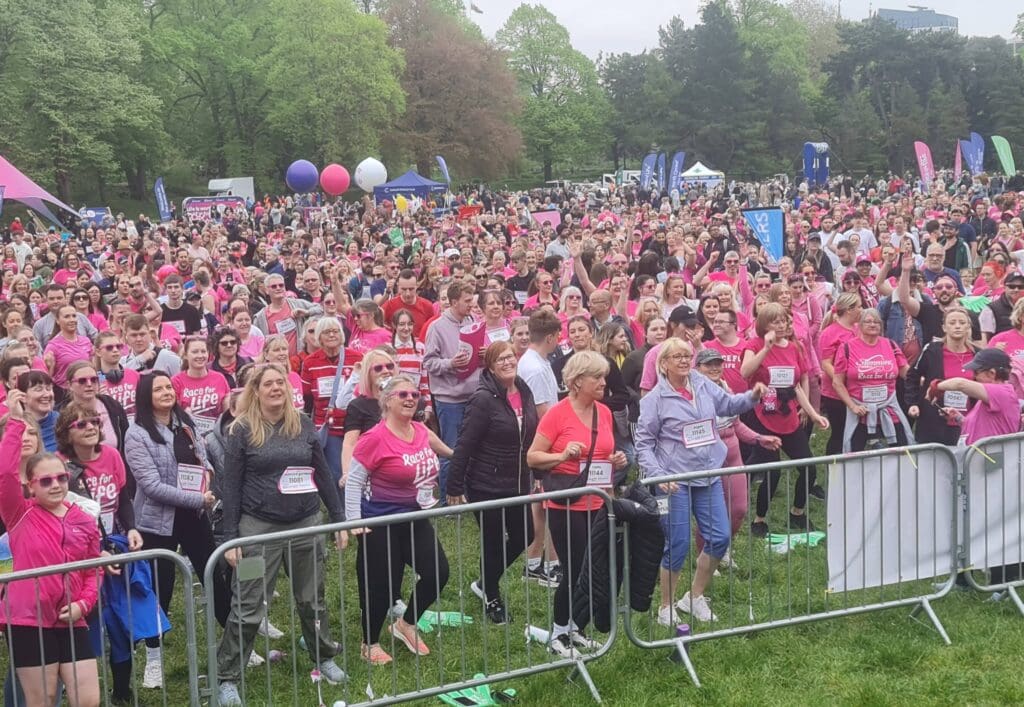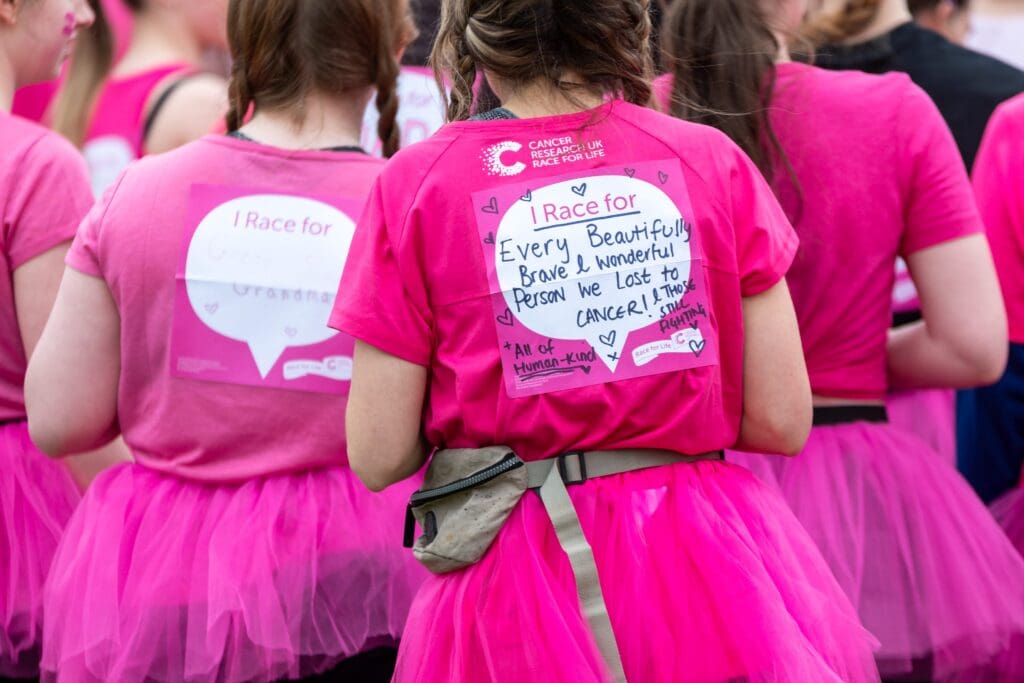PEOPLE in Cardiff united against cancer by taking part in Race for Life on Sunday (5 May).
Georgina Wren, who was diagnosed with cervical cancer at 25 following her first screening appointment, was chosen as VIP to kick off Cancer Research UK’s flagship fundraiser in Cardiff.
She sounded the horn at the start line to send more than 1,500 people on the 5k course at Coopers Field in Bute Park.
The event was part of a bumper weekend of activities which included Pretty Muddy and Pretty Muddy Kids, a mud splattered obstacle course. Around 6,000 people took in total part to support life-saving research.


More than £400,000 was raised for Cancer Research UK – vital funds which will enable scientists to find new ways to prevent diagnose and treat cancer, helping to save more lives.
Georgina, a PhD student at Cardiff University, said: “It’s thanks to advances in research and treatments that I’m still here to enjoy more time with the people I love.
“Cancer changed me. I’m definitely stronger. I’m more likely to take chances and grab opportunities now. It was a privilege to meet so many people today at Race for Life who have their own reason to support.”
Every year around 19,800 people are diagnosed with cancer in Wales.
Cancer Research UK’s Race for Life, in partnership with headline sponsor Standard Life, part of Phoenix Group, is an inspiring series of 3k, 5k, 10k, Pretty Muddy and Pretty Muddy Kids events which raise millions of pounds every year to help beat cancer by funding crucial research.
Georgina was diagnosed with cervical cancer in Feb 2023. Now cancer free, the rugby player and coach from Cardiff is urging others to take up their screening invite after being successfully treated for the disease.
“Cervical screening saved my life,” said Georgina. “I keep telling everyone to make sure they attend their smear test as it’s so important.”
Georgina had no symptoms before attending her first cervical screening appointment at her local GP surgery in February 2023.
A few weeks later, Georgina received a letter to say the test had shown some high grade, abnormal changes.
Georgina was invited to Cardiff’s University Hospital of Wales (UHW) for a colposcopy to remove abnormal cells in her cervix.
“It happened to be an oncologist removing the cells and I thought he would spend 10 minutes lasering the cells and that would be it,” said Georgina.
Instead, Georgina – a graduate teaching assistant at Cardiff University – was told the original procedure couldn’t take place as a 4cm tumour had been found on her cervix.
She said: “I was basically told I had cancer and I needed to return in two weeks.”
Georgina felt in utter disbelief and shock and broke down in tears in the hospital corridor.
She said: “I just couldn’t believe what I had been told and I remember falling to the floor in tears when I went to find a toilet. A lovely student doctor asked me if I was ok, but I just couldn’t process what was happening.”
Georgina, who is completing a doctorate in Psychological Medicine, was told she had stage 1 cervical cancer and was a couple of months away from developing stage 2 cancer.
As well as dealing with the shock of a diagnosis, Georgina was asked if she wanted to freeze her eggs in case she wanted to start a family in the future.
“It was really hard making such a big decision. I hadn’t given it much thought before as I was only 25,” said Georgina.
Georgina spent a long time discussing her options with her partner, Emily, before her surgery was due to take place to remove the cancerous tumour.
She said: “I decided IVF wasn’t the right thing for me and when I told the doctor, he said it wouldn’t have been possible anyway as they weren’t able to retrieve my eggs due to the size and stage of my tumour. The whole thing was just such an emotional rollercoaster.”
On April 20, Georgina – originally from Devon – had a full hysterectomy as well as lymph node removal.
She said: “I play for the ladies’ rugby team at Cardiff Uni and was due to play in a final match on the day of my surgery. I was so gutted to miss the game after reaching the final but, of course, I knew surgery was more important and the team were so supportive.”
Surgery went well but it was decided Georgina would need chemotherapy and radiotherapy as a preventive measure after surgeons discovered cancerous cells growing outside the cervix.
Georgina started chemotherapy at Cardiff’s Velindre Cancer Centre on June 12. She had five rounds of chemotherapy, 25 rounds of radiotherapy and five sessions of brachytherapy (a type of internal radiotherapy) which she completed in July.
Georgina rang the bell to mark the end of treatment on July 21 last year.
And now, Georgina is looking forward to a bright future and was thrilled to have been chosen to start Race for Life Cardiff.
She said: “I felt super excited to be the starter at Race for Life. Research is vital to prevent as well as treat cancer as it saves lives, it certainly saved mine.”


Now organisers of the 3k, 5k, 10k, Pretty Muddy events are sending a heartfelt message of thanks to everyone who put their best feet forward as well as their supporters. And they’re appealing for people to make every step count by paying in sponsorship money as soon as possible.
Ruth Amies, Cancer Research UK’s spokesperson in Wales, said: “We are incredibly grateful to everyone who took part in Race for Life Cardiff. We were especially honoured to be joined by Georgina who sounded the horn to start the 5k event.
“No matter how cancer affects us, life is worth racing for. Sadly nearly 1 in 2 of us will get cancer in our lifetime.** Race for Life has the power not only to transform lives, but to save them. We’re proud that Race for Life has already helped double survival rates in the UK.
“Life-saving research already helps people living with cancer every single day. It’s thanks to our supporters who fundraise that we can go further to discover new ways to beat the disease and create a future where everybody can live longer, better lives, free from the fear of cancer.
“It was a fantastic weekend at Race for Life Cardiff, full of emotion, courage, tears, laughter and hope as people celebrated the lives of those dear to them who have survived cancer and remembered loved ones lost to the disease.
“Now we’re asking everyone who took part to return the money they’re raised as soon as possible. Funds raised – whether it’s £10 or £100 – will help scientists find new ways to prevent, diagnose and treat cancer, helping save more lives.”
Since it began, more than 10 million people have taken part in Race for Life, funding 30 years of hope and progress. Money raised has helped develop radiotherapy which benefits more than 130,000 people with cancer in the UK every year.
Cancer Research UK funded scientists led the development of the Human Papillomavirus Virus vaccine, which is expected to prevent almost 90 per cent of cervical cancers in the UK. The charity also funded many large clinical trials looking at the effectiveness of the drug tamoxifen and the research shaped the way the drug is used to treat breast cancer today.
Andy Curran, Chief Executive of Standard Life, part of Phoenix Group, said: “We are incredibly proud to continue as headline sponsor for Cancer Research UK’s Race for Life, with the opportunity to encourage participation across the country.
“By working to raise funds for life-saving research, we can move towards a future where people live longer and healthier lives, free of cancer.”








Leave a Reply
View Comments